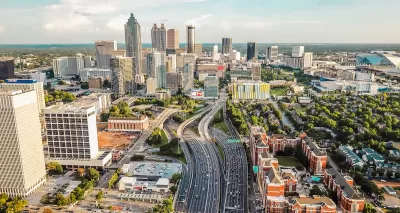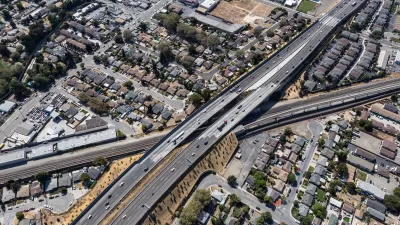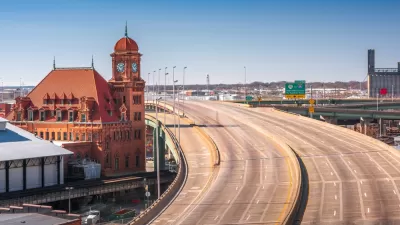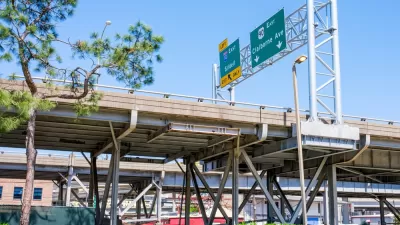Data shows cities lose millions in potential property taxes when highways displace homes and businesses.

For the first time, Smart Growth America’s Divided by Design report quantifies the financial losses brought on by freeway construction and the demolition of homes.
As María Paula Mijares Torres explains in Bloomberg CityLab, “The report uses data from the US census, the Federal Highway Administration and local highway archives to analyze the land physically occupied by a small number of highways and the surrounding buffer zones in DC and Atlanta and compare it to the current tax rate of that area.” The report estimates that D.C. loses at least $7.6 million in annual property taxes on at least $1.4 billion in never-built housing.
“These numbers don’t take into account the commercial property taxes that could have been generated by the thousands of businesses that were destroyed for these freeways, according to Megan Wright, an economic development associate at Smart Growth America who worked on the report.”
Currently, the U.S. Department of Transportation uses ‘value of travel time savings’ to estimate the economic benefit of new highways, but doesn’t address the negative impacts. And while the federal government has expressed a commitment to tearing down and redeveloping highways, “Smart Growth America’s researchers called the $4 billion reconnecting communities initiative a ‘pittance’ compared to the rest of the infrastructure law, which gives localities wide discretion to build and expand highways.”
FULL STORY: Urban Highways Cost Billions in Lost Home Value, Property Taxes

Alabama: Trump Terminates Settlements for Black Communities Harmed By Raw Sewage
Trump deemed the landmark civil rights agreement “illegal DEI and environmental justice policy.”

Study: Maui’s Plan to Convert Vacation Rentals to Long-Term Housing Could Cause Nearly $1 Billion Economic Loss
The plan would reduce visitor accommodation by 25% resulting in 1,900 jobs lost.

Why Should We Subsidize Public Transportation?
Many public transit agencies face financial stress due to rising costs, declining fare revenue, and declining subsidies. Transit advocates must provide a strong business case for increasing public transit funding.

Paris Bike Boom Leads to Steep Drop in Air Pollution
The French city’s air quality has improved dramatically in the past 20 years, coinciding with a growth in cycling.

Why Housing Costs More to Build in California Than in Texas
Hard costs like labor and materials combined with ‘soft’ costs such as permitting make building in the San Francisco Bay Area almost three times as costly as in Texas cities.

San Diego County Sees a Rise in Urban Coyotes
San Diego County experiences a rise in urban coyotes, as sightings become prevalent throughout its urban neighbourhoods and surrounding areas.
Urban Design for Planners 1: Software Tools
This six-course series explores essential urban design concepts using open source software and equips planners with the tools they need to participate fully in the urban design process.
Planning for Universal Design
Learn the tools for implementing Universal Design in planning regulations.
Smith Gee Studio
Alamo Area Metropolitan Planning Organization
City of Santa Clarita
Institute for Housing and Urban Development Studies (IHS)
City of Grandview
Harvard GSD Executive Education
Toledo-Lucas County Plan Commissions
Salt Lake City
NYU Wagner Graduate School of Public Service





























